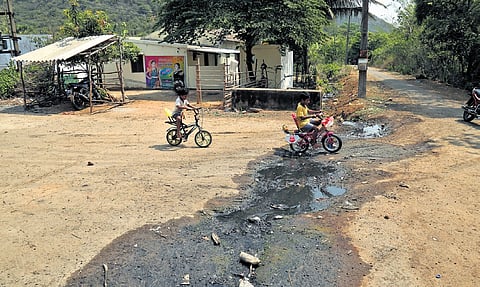

VISAKHAPATNAM : Nestled just 15 kilometres away from the bustling city limits of Visakhapatnam lies Sambhuvanipalem, the sole tribal hamlet in the region.
Home to approximately 65 families and 300 to 350 Manne Dora tribals, this village finds itself amid the serene expanse of the Kambalakonda Wildfire Sanctuary reserved forest.
Despite its proximity to urban areas, Sambhuvanipalem grapples with a host of challenges, especially in accessing fundamental infrastructure, even within a municipal jurisdiction.
The village falls under Bheemili constituency and boasts good road connectivity, with a checkpost positioned three kilometres away to regulate public access. However, residents lament the absence of street lights along this vital stretch, making night time commutes perilous for pedestrians and motorists alike.
Villagers also highlighted the dire need for an improved drainage system, citing the sight of open sewage flowing through the streets as a persistent health hazard.
V Demudu, the village head, rued, “We do not have culverts. The drainage system is very poor. The drainage water keeps flowing openly, causing diseases for both us and our livestock.” Despite outward appearances of prosperity, the reality for Sambhuvanipalem’s inhabitants is starkly different. Employment opportunities are scarce, forcing many to rely on daily-wage work. “We built our houses long ago by selling some of our lands, but we hardly have any employment sources,” Demudu shared.
The forest department offers work, such as forest watchers and employment at the Eastern Ghats Biodiversity Centre. Additionally, villagers cultivate cashew plantations to supplement their income, while during lean periods, they seek daily-wage labour elsewhere.
After years of struggle, it should be noted that the village was finally provided with an RTC bus facility. This service aids children in commuting to schools and colleges and enables others to travel for work.
Despite having an Anganwadi centre, a primary school, and a community hall, Sambhuvanipalem lacks a primary health centre (PHC). This void forces villagers to travel four to five kilometres for medical needs, exacerbating their plight.
Emphasising this burden, the villagers expressed, “Having a PHC in the village will benefit us so that we don’t have to travel long distances for every minor health issue.”
Moreover, recent health trends are troubling. A surge in kidney problems residents and persistent virulent fevers have raised concerns about water quality. “We have access to water supply all the time, but we have a feeling the causes of health problems have something to do with the quality of our drinking water,” Demudu noted.
The transfer of a Greater Visakhapatnam Municipal Corporation (GVMC) worker, tasked with village upkeep, has compounded their woes.
He now only visits the region once a month, which the tribals say is insufficient to maintain cleanliness effectively. “Another problem we have is that of erratic power supply. Once there is a power cut, it takes them hours to restore it,” Demudu lamented.
Political apathy further deepens residents’ disillusionment. Demanding tangible solutions over fleeting assurances, villagers said, “No matter who the politician is or which party he is from, they only come to our village before elections and can never be seen again. We want someone who can solve our problems and not just give us assurances based on votes.”